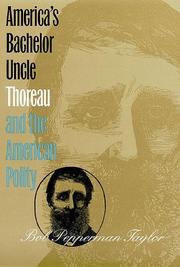| Listing 1 - 3 of 3 |
Sort by
|
Periodical
Abstract | Keywords | Export | Availability | Bookmark
 Loading...
Loading...Choose an application
- Reference Manager
- EndNote
- RefWorks (Direct export to RefWorks)
People with visual disabilities --- Orientation and mobility --- Services for
Book
ISBN: 0472120859 0472903802 Year: 2010 Publisher: Ann Arbor, Michigan : The University of Michigan Press,
Abstract | Keywords | Export | Availability | Bookmark
 Loading...
Loading...Choose an application
- Reference Manager
- EndNote
- RefWorks (Direct export to RefWorks)
Bold, deeply learned, and important, offering a provocative thesis that is worked out through legal and archival materials and in subtle and original readings of literary texts. Absolutely new in content and significantly innovative in methodology and argument, Stumbling Blocks Before the Blind offers a cultural geography of medieval blindness that invites us to be more discriminating about how we think of geographies of disability today." ---Christopher Baswell, Columbia University "A challenging, interesting, and timely book that is also very well written . . . Wheatley has researched and brought together a leitmotiv that I never would have guessed was so pervasive, so intriguing, so worthy of a book." ---Jody Enders, University of California, Santa Barbara Stumbling Blocks Before the Blind presents the first comprehensive exploration of a disability in the Middle Ages, drawing on the literature, history, art history, and religious discourse of England and France. It relates current theories of disability to the cultural and institutional constructions of blindness in the eleventh through fifteenth centuries, examining the surprising differences in the treatment of blind people and the responses to blindness in these two countries. The book shows that pernicious attitudes about blindness were partially offset by innovations and ameliorations---social; literary; and, to an extent, medical---that began to foster a fuller understanding and acceptance of blindness. A number of practices and institutions in France, both positive and negative---blinding as punishment, the foundation of hospices for the blind, and some medical treatment---resulted in not only attitudes that commodified human sight but also inhumane satire against the blind in French literature, both secular and religious. Anglo-Saxon and later medieval England differed markedly in all three of these areas, and the less prominent position of blind people in society resulted in noticeably fewer cruel representations in literature. This book will interest students of literature, history, art history, and religion because it will provide clear contexts for considering any medieval artifact relating to blindness---a literary text, a historical document, a theological treatise, or a work of art. For some readers, the book will serve as an introduction to the field of disability studies, an area of increasing interest both within and outside of the academy. Edward Wheatley is Surtz Professor of Medieval Literature at Loyola University, Chicago.
Blind --- Disability studies. --- People with disabilities --- Sociology of disability --- Education --- Blind people --- Blind persons --- Blindness --- People with visual disabilities --- Deafblind people --- History --- Study and teaching --- Curricula --- Patients --- Blind -- France -- History -- To 1500.;Blind -- Great Britain -- History -- To 1500.;Disability studies.

ISBN: 0700608060 0700631267 Year: 1996 Publisher: University Press of Kansas
Abstract | Keywords | Export | Availability | Bookmark
 Loading...
Loading...Choose an application
- Reference Manager
- EndNote
- RefWorks (Direct export to RefWorks)
Emphatically revisionist, Bob Pepperman Taylor reveals a Thoreau most people never knew existed. Contrary to conventional views, Taylor argues that Thoreau was one of America's most powerful and least understood political thinkers, a man who promoted community and democratic values, while being ever vigilant against the evils of excessive or illegitimate authority.Still widely viewed as a remarkable nature writer but simplistic philosopher with no real understanding of society, Thoreau is resurrected here as a profound social critic with more on his mind than utopian daydreams. Rather than the aloof and very private individualist spurned by conservatives and championed by radicals and environmentalists, Taylor portrays Thoreau as a genuinely engaged political theorist concerned with the moral foundations of public life. Like a solicitous "bachelor uncle" (a selfreferential phrase from his journals), Thoreau persistently prodded his fellow citizens to remember that they were responsible for independently evaluating the behavior of their government and political community. Taylor contends that, far from being confined to a few political essays ("Civil Disobedience," "Slavery in Massachusetts," and "A Plea for Captain John Brown"), Thoreau's political critique was a lifetime project that informed virtually all of his work. Taylor's persuasive study should send readers back to Walden, A Week on the Concord and Merrimack Rivers, and the 14volume Journal, among many other writings, for a provocative new look at one of America's most influential writers.
Thoreau, Henry David --- Political and social views --- National characteristics [American ] in literature --- Politics and literature --- United States --- History --- 19th century --- Large type books. --- English language --- Large print books --- Sight-saving books --- Books --- People with visual disabilities --- Books and reading --- Thoreau, Henry David, --- Political and social views. --- Thoreau, Henry D. --- Toro, Genri Devid, --- Thoreau, Henry, --- Toro, Henri Dejvid, --- Thorō, Enry Deēvint, --- So-lo, --- Toro, Henri Daṿid, --- Thoreau, David Henry, --- Sorō, Henrī Deividdo, --- טהארא, הענרי דייוויד --- טהארא, הענרי דײװיד --- תורו, הנרי דוד --- תורו, הנרי דוד, --- 梭罗, --- ソロー ヘンリー・デイヴィッド, --- Germanic languages --- Political science & theory
| Listing 1 - 3 of 3 |
Sort by
|

 Search
Search Feedback
Feedback About
About Help
Help News
News